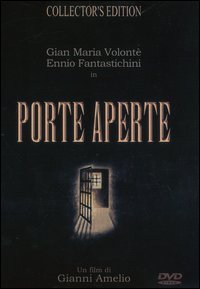
| None | Light | Moderate | Heavy | |
|---|---|---|---|---|
| Language | ||||
| Violence | ||||
| Sex | ||||
| Nudity |
Content:
(L, V, S) Few obscenities; rape; and, murder
More Detail:
Through a combination of relentless images and crisp, earthen cinematography juxtaposed with hum-drum daily life, the Italian film OPEN DOORS imparts a neo-realistic flavor to Judge Vito Di Francesco’s moral dilemma. The Judge adamantly opposes capital punishment, yet he must come to a just decision concerning accused triple murderer, Tommasso Scalia.
Set in 1937 Fascist Italy, the film opens with Scalia brutally raping his wife, then shooting her. Subsequently, the police put him in jail where he awaits the jury’s verdict.
The remainder of the movie deals with the private lives of the jury and Judge Di Francesco. Thus, the obtrusive eye of the camera follows the jury members and the judge through their intimate moments such as eating a meal, or visiting a family grave.
Always, with the jury members and Di Francesco, any discussion turns to Scalia’s trial. All of the jury, excepting the Judge and Giovanni Consolo, a highly literate farmer, favor the death sentence. However, Di Francesco continually mulls over the evidence in an effort to ferret out undiscovered truth and spare Scalia’s life.
Perhaps Scalia is not guilty. Of course, his accusation includes two other murders as well as his wife’s. In Di Francesco’s mind, there appears to be a relationship between the murders since the parties, Scalia’s superior and his successor to the bureaucratic job he was fired from, knew each other. So the Judge, along with Consolo, probes and searches for evidence.
The remarkable aspect of OPEN DOORS is its penetrating character study of both major and minor personages. Old and young, adults and children, good people with flaws, bad people with patches of virtue, peripheral figures barely glimpsed–all contribute something to a story told so elliptically that it makes serious demands on the viewer, but offers abundant rewards. Small wonder that Leonardo Sciascia’s novel-turned-movie was an Academy Award nomination for Best Foreign Language Film.
In the final analysis, the film is an exploration of conflicting ideologies: that of the quick, expedient remedy versus that of the thoughtful, long-range solution. Here, the thoughtful ideology is Dostoyevskian and reflects, to some degree, his concern with sin and remorse.
OPEN DOORS affords a remarkable contrast with violent, sex-filled American movies and therefore demands intense thought and concentration in the viewer. Moreover, the acting, plot, and cinematography are superb and offer the diligent viewer a treat, despite the episode of rape and murder in film’s opening. Nonetheless, OPEN DOORS offers a prime example of justice rightly administered thus illustrating the high standards set forth in the Bible: “Righteousness and justice are the foundation of Your throne” (Psalm 89:14). How rewarding it is to view such an honorable, thought-provoking film based on a decent, lofty premise! However, exercise extreme caution with regard to the rough opening scenes.
Set in 1937 Fascist Italy, the film opens with Scalia brutally raping his wife, then shooting her. Subsequently, the police put him in jail where he awaits the jury’s verdict.
The remainder of the movie deals with the private lives of the jury and Judge Di Francesco. Thus, the obtrusive eye of the camera follows the jury members and the judge through their intimate moments such as eating a meal, or visiting a family grave.
Always, with the jury members and Di Francesco, any discussion turns to Scalia’s trial. All of the jury, excepting the Judge and Giovanni Consolo, a highly literate farmer, favor the death sentence. However, Di Francesco continually mulls over the evidence in an effort to ferret out undiscovered truth and spare Scalia’s life.
Perhaps Scalia is not guilty. Of course, his accusation includes two other murders as well as his wife’s. In Di Francesco’s mind, there appears to be a relationship between the murders since the parties, Scalia’s superior and his successor to the bureaucratic job he was fired from, knew each other. So the Judge, along with Consolo, probes and searches for evidence.
The remarkable aspect of OPEN DOORS is its penetrating character study of both major and minor personages. Old and young, adults and children, good people with flaws, bad people with patches of virtue, peripheral figures barely glimpsed–all contribute something to a story told so elliptically that it makes serious demands on the viewer, but offers abundant rewards. Small wonder that Leonardo Sciascia’s novel-turned-movie was an Academy Award nomination for Best Foreign Language Film.
In the final analysis, the film is an exploration of conflicting ideologies: that of the quick, expedient remedy versus that of the thoughtful, long-range solution. Here, the thoughtful ideology is Dostoyevskian and reflects, to some degree, his concern with sin and remorse.
OPEN DOORS affords a remarkable contrast with violent, sex-filled American movies and therefore demands intense thought and concentration in the viewer. Moreover, the acting, plot, and cinematography are superb and offer the diligent viewer a treat, despite the episode of rape and murder in film’s opening. Nonetheless, OPEN DOORS offers a prime example of justice rightly administered thus illustrating the high standards set forth in the Bible: “Righteousness and justice are the foundation of Your throne” (Psalm 89:14). How rewarding it is to view such an honorable, thought-provoking film based on a decent, lofty premise! However, exercise extreme caution with regard to the rough opening scenes.


 - Content:
- Content: 
